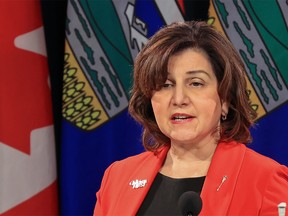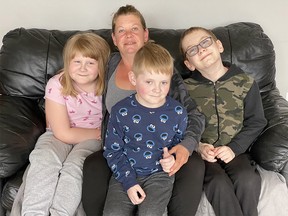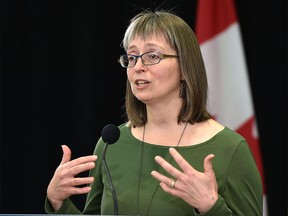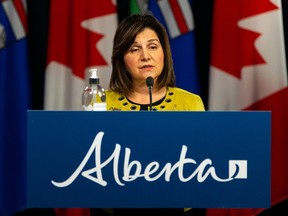Alberta parents, teachers' union question province's decision to resume in-person classes
Heading back to school during Omicron wave is like sending kids to a 'COVID soup,' Edmonton mom says
Alberta parents are preparing to send their children back to in-person classes next week, some with reluctance and trepidation as the Omicron variant continues to spread quickly in community settings.
Marie Watts, who has two teenagers in school in southeast Edmonton, one in Grade 9 and the other in Grade 11, believes sending kids back to the classroom isn't safe.
With record-high cases and a high transmission rate of Omicron within the community, it's not appropriate to send children back to in-person learning next week, Watts said Wednesday.
"I'm pretty angry about it actually," Watts said. "I'm concerned that we're just going to be putting a bunch of kids in a COVID soup and hoping it all works out."
Watts said classes are lacking high-quality air filtration systems and the province should be handing out the more effective N95 masks, instead of medical masks.
Many children are feeling anxious, she noted.
"The kids don't really want to go back but they need to finish school," Watts said.
Eager to get back
Other families welcome the return in-person learning.
Daynelis Brito's three children — aged eight, 10 and 12 — have been going to class since schools were allowed to reopen last spring.
She said she trusts the schools will do their best to keep students safe.
"So far, there has not been much issue with the kids getting sick," Brito said. "And the kids are eager to go back to school."
Brito also believes symptoms of Omicron infection are mild and it's just a matter of time before it becomes more common in the community.
"All you have to do is wish for the best, because it's everywhere, right?"
Alberta Teachers' Association president Jason Schilling said the province isn't doing enough to make sure the classrooms are safe.
Schilling said the province needs to invest in KN95 masks, instead of the blue medical ones.
"I'm frustrated beyond words sometimes when I hear our government leaders saying, 'We are doing everything that we possibly can to ensure that our schools and our staff are safe,'" he said. "I don't buy it when we hear this from our leaders."
Watts said the province should keep learning online for another couple of weeks.
"It also buys time to do things like finally getting air purifiers in classrooms and maybe actually getting kids masks that protect from airborne viruses like the N95 type," she said.
"Then once these things are in place, once the schools are safer, then let the kids go back. But don't put them back in now, wait for it all to fall apart and then send them back online class by class."
Semesters online
Edmonton Public Schools is offering online options to students for the second half of the school year from Feb. 1 to June 28, but families must choose by Jan. 11 and commit to the full semester.
"After Jan. 11, 2022, students cannot move from in-person to online learning," the website says. "This deadline ensures schools have enough teaching staff assigned to both online and in-person classes."
Students wanting to switch to in-person learning need to consult the school to see if there's space in a specific grade or program.
Watts said some subjects are not offered widely in the online format, making it difficult for students to enrol in courses they need to graduate
'I have 100 per cent certainty that when kids go back to school, cases will rise and hospitalizations will rise'
Author of the article: Eva Ferguson
Publishing date: Jan 05, 2022 •

With the province confirming K-12 students will return to classrooms Monday, doctors and parents fear limited school protections will result in a further explosion of Omicron cases, hospital capacity crunches and an eventual shuttering of schools again.
Education Minister Adriana LaGrange announced Wednesday that schools will open to in-person learning Jan. 10, promising “a safe return” through the delivery of rapid test kits and new “medical grade” masks to schools by Jan. 14.
ONE IS A SUNDAY SCHOOL TEACHER THE OTHER IS A UCP SUPPORTER
LaGrange and chief medical officer of health Dr. Deena Hinshaw said the mental health and education benefits of in-person learning outweigh the risks of COVID infections in children, which rarely result in severe outcomes.
“There is high transmissibility in the community, and it will come into schools and into classrooms,” LaGrange said.
“But we need to mitigate that with the overall health of our children. It’s very important they return to in-person learning.”
Dr. Shazma Mithani, an emergency room physician who treats COVID patients at Edmonton’s Royal Alexandra and Stollery Children’s hospitals, says she, too, wants to see kids in schools.
But she fears that rapid tests and low-grade masks — not N95s — will not do enough to stop the spread of the highly transmissible Omicron variant.
“I have 100 per cent certainty that when kids go back to school, cases will rise and hospitalizations will rise,” Mithani said.
“It’s just simple math. And the province knows this, too. We’re just kicking the can down the road.”
Mithani said students and staff should be provided N95 respirator masks to prevent airborne transmission of Omicron, which is “seven times more transmissible” than the original strain.
She added that rapid tests only provide a brief window into whether someone is positive, and very often the test results are not accurate.
“I have heard from many, many people that their tests are false negatives . . . or they are testing negative while they are symptomatic.”
LaGrange announced late last Wednesday that K-12 schools would have an extended winter break to allow school districts to prepare for the ongoing spread of Omicron, which has resulted in record high case counts across the country.
But after confirming this Wednesday that kids will go back, in spite of even wider spread, LaGrange added that school districts have the flexibility to shut down individual classrooms or buildings temporarily, without affecting other jurisdictions that are controlling cases.
After a difficult academic year of back and forth learning from in-person to online in 2020-21, LaGrange said students cannot afford any further learning gaps. The province has also created an online tutoring resource, she added, which kicks in next week to help students catch up with literacy and numeracy learning.
“We are doing everything we can to help get students back on track.”

But Dr. Wing Li, spokeswoman for the Support Our Students advocacy group, said schools cannot open safely — or stay open — without several meaningful layers of mitigation, including better masks, better ventilation through HEPA filters and smaller class sizes.
“We have the tools, we have navigated many months of this pandemic,” Li said.
“Yet we lack the political will . . . and when we get one measure we have others taken away. Rapid tests are arriving, but we no longer have PCR tests.”
Albertans continue to have difficulty accessing COVID tests, with many pharmacies running out of rapid test kits. Hinshaw has also advised that only people with symptoms should book PCR tests, but even those are not immediately available.
Jen Allan, a mother of three special-needs students in Beiseker, just north of Calgary, is terrified about sending her kids back to school next week, torn over what is worse — learning loss by staying home or health risks by going back.
“I cannot call what my kids have received in this past year an education. I call it more of a deprivation,” said Allan, who has kids in grades 1, 3 and 5.
Her youngest son is on the autism spectrum and has severe difficulties learning online. And her eldest has medical issues, which put him at higher risk of severe illness with COVID.
Allan worries that even if her kids go back, her rural school will not get access to rapid tests or new masks.
“We get very little in rural areas. Our pharmacies have not even received vaccines for children yet, they are only for adults for now.”

Dr. Joe Vipond, a Calgary doctor with the Protect Our Province advocacy group, said in his livestream Wednesday he, too, is concerned about schools opening amid rapidly increasing cases, including in pediatrics.
With Alberta Health Services confirming an additional 4,752 new cases of COVID on Wednesday, Vipond said “that’s nowhere near to what is actually happening in the community. It’s a poor, fuzzy picture of what’s really happening.”
Vipond added that among the 470 people now in hospital with COVID, 31 are pediatric admissions.
“Our government says COVID is airborne, but there is no mitigation acknowledging that. If you do not mitigate with the right form of transmission, you will fail.
“You can deep clean all you want, it won’t make a difference.”
Parents across Alberta have been advocating for HEPA filters for months, but the province and school officials are adamant that ventilation in schools is above standard.

Schools to get rapid tests and masks, but staffing uncertain amid looming Omicron surge

Clarity needed amid back-to-school delay, says teachers' union leader

ATA calls for more information, province-wide standards on school protections after return to learning delayed

Return to learning delayed until Jan. 10, Diploma exams cancelled, announces Education Minister LaGrange
DR.HINSHAW IS A UCP ENABLER
Alberta students will return to in-school learning Jan. 10, education minister says
Rapid tests and masks will be distributed to schools

Alberta students in kindergarten to Grade 12 will return to their classrooms on Jan. 10 after an extended holiday break, Education Minister Adriana LaGrange said Wednesday.
On Dec. 30, the province had announced it was delaying the post-holiday reopening of schools province-wide after boards requested more time to assess the impact of the new Omicron variant in the classroom.
Winter break for K-12 students was extended to Jan. 10, but the government said it had not made decisions on whether students will be learning in class or at home.
LaGrange said Wednesday that all students will return to learning in their classrooms.
"Over the past several days my team and I have continued to work closely with school authorities," LaGrange told a news conference. "I am extremely grateful for their input and I am so pleased to confirm that ECS (early childhood services) and kindergarten to Grade 12 students will return to classrooms on Jan. 10.
"Children who learn in person belong in the classroom and they will be there with the added safety of rapid tests and medical-grade masks."
The rapid tests and masks will be distributed to schools as "an added layer of protection to lower the risk of transmission of the Omicron variant," LaGrange said.
The government will begin distributing shipments of rapid tests and masks later this week and all schools will have their initial shipments by the end of next week. LaGrange said the shipments to schools will be in phases.
Students should wear masks, Hinshaw says
Dr. Deena Hinshaw, Alberta's chief medical officer of health, said there are no "risk-free solutions" but that she believes the province's approach is prudent.
"There is a very high transmission risk right now and I continue to advise that people do everything they can to minimize the number of close contacts they have," Hinshaw said.
"However, I also believe that if we were to shut schools across the entire province, we would be imposing much greater harm on all of those students by not allowing them the opportunity for in-school learning at this time."
She said the use of rapid testing, medical masks and other measures will help to protect students and staff.
"Given the current situation, I also want to note that I strongly recommend that students in all grades wear masks, including kindergarten to Grade 3," she said. "To keep the risk in schools low it will be critical for all of us to stay home and keep our children home if any of us have symptoms."
School authorities will have flexibility to shift a class or an individual grade to short-term at-home learning if needed to address operational challenges at a school, the province said in a news release.
Decisions on shifting entire schools or school authorities to at-home learning will continue to be made by the Alberta government, with input from school authorities, it said.
Online tutoring coming
LaGrange said free online-tutoring resources will be available starting next week for students in grades 4 to 9 who need to catch up on skills after falling behind due to the pandemic.
The tutoring resource will be launched with pre-recorded video tutoring sessions to improve students' literacy and numeracy skills. The province plans to expand the service later in the year to cover more grades and subjects and add live tutoring.
As of Wednesday, there were 470 people with COVID-19 in hospital in Alberta, up from 436 on Tuesday, with 72 of those patients in intensive care, 11 more than on Tuesday.
Hinshaw reported 11 new deaths from COVID-19 on Wednesday, and a test positivity of 36.9 per cent.
Positivity rates across the province are the highest since the beginning of the pandemic.
The decision comes as the Omicron variant is rapidly spreading across the country
Author of the article: Stephanie Babych
Publishing date: Jan 05, 2022

As Alberta reported another day of record-high COVID-19 cases, the province announced kindergarten to Grade 12 students will return to classrooms Monday.
Education Minister Adriana LaGrange said Wednesday the province will distribute medical-grade masks and rapid test kits to schools as an added precaution for students and staff heading back to school after an additional week of winter break
The decision comes as the Omicron variant is rapidly spreading across the country. In Alberta, there are 37,196 cases of COVID-19 confirmed by PCR test, which is only a portion of the actual number of cases since PCR testing is limited.
A record 4,752 new cases were reported Wednesday with the highest test positivity rate logged in the province at 36.9 per cent. The data doesn’t include positive results from the rapid antigen tests Albertans are using at home, which Premier Jason Kenney noted on Tuesday means numbers are actually much higher than what’s being reported.
The number of COVID patients in hospital jumped to 470 from 436 a day earlier. Of the 470 hospitalized patients, 72 are in intensive-care units — an increase of 11 in a single day.
Dr. Deena Hinshaw, the province’s chief medical officer of health, said another 11 deaths were reported to Alberta Health, bringing the COVID-19 death toll to 3,333.
Despite the widespread transmission of Omicron, Hinshaw said she believes restarting in-person instruction at schools is prudent.
“The community transmission risk right now is the highest it’s ever been. I want to be clear that out in the general community, no matter what the setting, there is a very high transmission rate right now. I continue to advise that people do everything they can to minimize the number of close contacts they have,” said Hinshaw.
“However, I also believe that if we were to shut schools across the entire province, we would be imposing much greater harm on all of those students by not allowing them the option for in-school learning at this time.”

Shipments of the rapid tests and masks for schools will start this week, and schools can expect to receive their first shipment by the end of next week. Students will receive their supplies from the school once shipments are received, said LaGrange.
“Alberta Education is continuing to work closely with school authorities to support shifts that may be required for operational reasons, such as student or staff absences,” she said.
School authorities will be able to transition individual classes or grades to at-home learning if it is necessary as a short-term solution.
“As I’ve said before, I’m always so impressed by the resilience shown by our students, our staff, our school boards and our families in the whole education system,” said LaGrange.
She said the additional safety measures are meant to supplement the physical distancing, cohorting and cleaning policies, and availability of vaccines for students and staff.

Just over 37 per cent of children aged five to 11 have received their first dose of vaccine in Alberta, while 85.3 per cent of those aged 12 and over have gotten at least two doses.
Alberta has also administered 1,035,726 booster doses of vaccine.
Everyone has a role to play in keeping schools open and children safe by limiting community transmission, Hinshaw said.
“Next to getting vaccinated, the most critical thing we can do is stay home if we’re sick even with the mildest of symptoms. Wearing masks and keeping our distance at all times also reduces our risk of spreading the virus but they cannot eliminate all risks of exposure,” she said.
Parents and guardians must complete a health assessment of their children before sending them to school to see if there are any signs of illness and should do a rapid test a couple of times a week to screen for asymptomatic infection, Hinshaw said.
With the overwhelming volume of infections, Alberta Health Services no longer has the capacity to do full case investigations of non-high-risk cases and will only be further investigating cases linked to high-risk settings such as continuing care and health-care facilities. Other cases confirmed by PCR test will be notified of the result and informed about isolation requirements.
Alberta’s post-secondary institutions are opting to keep most students online for the first few weeks of classes as a new semester begins.
The University of Calgary has started classes online, with an exemption for courses where there is a requirement the students attend in person, at least until the end of the month.
With the semester starting this week at the Southern Alberta Institute of Technology, most classes are online until at least Jan. 21, according to a news release from SAIT. On-campus labs will run in-person starting Jan. 10.
When classes start up again at Mount Royal University on Monday, the majority of courses will be delivered virtually until Jan. 22. As well, Bow Valley College will be starting the new term on Monday with a temporary switch to online learning until at least Jan. 21.

No comments:
Post a Comment